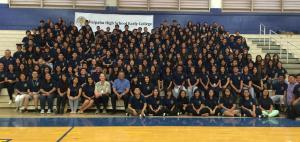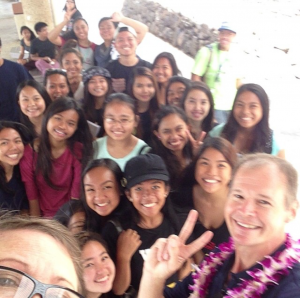Leeward Community College Selected for National Pilot Project
Expanding College Access Through the Dual Enrollment Pell Experiment
Leeward Community CollegeDir of Mktg, Chancellor's Office
Kami Kato, 808 455-0236
Student Services Officer, Student Services
The U.S. Department of Education invited Leeward Community College (Leeward CC) to be one of only 44 postsecondary institutions nationwide to participate in an experiment that – for the first time – allows high school students taking college-credit courses to access Federal Pell Grants. Leeward CC is the only higher education institution in the State of Hawai‘i selected for the project. Pell grants are for qualifying low-income individuals and do not have to be repaid.
The federal project seeks to expand college access through dual enrollment programs, such as Early College, in which students enroll in college courses while enrolled in high school. Dual enrollment is a promising approach to improve academic outcomes for students, particularly those from low-income backgrounds.
“Dual enrollment programs are powerful ways to introduce rigorous coursework to students and show these students that they are smart enough, talented enough, and prepared enough to tackle higher education. Dual enrollment programs are game changers for all students – especially those who are first-generation or from low-income families,” said Education Under Secretary Ted Mitchell. “Through this experiment, we hope to learn how the availability of Pell Grants affects student participation and success in dual enrollment programs.”
Leeward CC is a leader in dual enrollment programs, coordinating Early College, JumpStart, Running Start and Early Admit options. These programs have grown dramatically, totaling more that 500 high school participants in Spring 2016. Leeward’s Early College program alone, where college courses are offered at the high school campuses, has witnessed more than 1000% increase in less than 4 years, with 41 students enrolled in Fall 2012 and a total of 460 in Spring 2016.
The participation in the federal Pell Grant experiment will enable an additional 30 students per year from the partnering high schools, Waipahu, Campbell and Wai‘anae high schools to participate in Leeward’s Early College program. With the expansion of the Early College partnership, students will be able to choose and pursue formal programs of study and then access the courses relevant to those degree programs.
Leeward’s Chancellor Manny Cabral credits the college’s counselors, division chairs, support staff, Early College teaching faculty and deans for the success of the program.
Cabral states: “Over the past 4 years, Leeward has provided successful early college courses to several of our area high schools. In particular, we've had an incredible synergy working with Waipahu H.S. and Principal Keith Hayashi and Dr. Mark Silliman. Several of the Waipahu H.S. students are already members of our PTK national honor society. I look forward to the first Waipahu H.S. "Olympians" who started in their freshman year and who will be completing their AA Degree at the same time they receive their high school diploma in 2018.”
University of Hawai'i President David Lassner says: "This is a well-deserved recognition of the Leeward Community College faculty, staff and leadership pulling together to help students achieve their goals and dreams through higher education. Early College has proven to be a successful strategy in Hawai'i and around the country, and Pell Grant eligibility may be a critical tool in helping us scale it up for those in greatest need. We are incredibly proud that Leeward was selected by the US Department of Education as one of just 44 innovative institutions across the country that will pioneer this gamechanger for our nation."
Earning a college degree is an increasingly important step towards entering the middle class. Yet less than 10 percent of children born in the bottom quartile of household incomes attain a bachelor’s degree by age 25, compared to over 50 percent in the top quartile. Many high school students—especially those from low-income backgrounds—lack access to the rigorous coursework and support services that help prepare them for success in college.
While dual enrollment models have shown promising academic outcomes for students, cost can be a barrier. Through this experiment, an estimated 10,000 high school students will have the opportunity to access approximately $20 million in Federal Pell Grants to take dual enrollment courses provided by colleges and high schools throughout the nation.
For more information on the program, contact Kami Kato, Leeward’s Early College coordinator, 455-0236.
2016 Postsecondary Institutions Invited to Participate
44 postsecondary institutions across 23 states will be invited to participate.
- Adams State University (Alamosa, Colorado)
- Asnuntuck Community College (Enfield, Connecticut)
- Bard College (Annandale-on-Hudson, New York)
- Benedict College (Columbia, South Carolina)
- Bristol Community College (Fall River, Massachusetts)
- Carl Sandburg College (Galesburg, Illinois)
- Cayuga Community College (Auburn, New York)
- Central Virginia Community College (Lynchburg, Virginia)
- College of Southern Maryland (La Plata, Maryland)
- Community College of Beaver County (Monaca, Pennsylvania)
- Cowley County Community College (Arkansas City, Kansas)
- Gateway Community College (New Haven, Connecticut)
- George C. Wallace Community College (Hanceville, Alabama)
- Germanna Community College (Fredericksburg, Virginia)
- Glenville State College (Glenville, West Virginia)
- Guilford Technical Community College (Jamestown, North Carolina)
- Hagerstown Community College (Hagerstown, Maryland)
- Holyoke Community College (Holyoke, Massachusetts)
- Illinois Central College (East Peoria, Illinois)
- Jackson State University (Jackson, Mississippi)
- Leeward Community College (Oahu, Hawaii)
- Louisiana State University (Eunice, Louisiana)
- Mississippi Gulf Coast Community College (Perkinstown, Mississippi)
- Naugatuck Valley Community College (Waterbury, Connecticut)
- Niagara County Community College (Sanborn, New York)
- North Country Community College (Saranac Lake, New York)
- Northeast State Community College (Blountville, Tennessee)
- Northeastern Technical College (Cheraw, South Carolina)
- Norwalk Community College (Norwalk, Connecticut)
- Owensboro Community and Technical College (Owensboro, Kentucky)
- Quinebaug Valley Community College (Danielson, Connecticut)
- Ranger College (Ranger, Texas)
- Ranken Technical College (St. Louis, Missouri)
- Southern New Hampshire University (Manchester, New Hampshire)
- Southwest Tennessee Community College (Memphis, Tennessee)
- Southwestern Illinois College (Belleville, Illinois)
- Sullivan County Community College (Loch Sheldrake, New York)
- SUNY Adirondack (Queensbury, New York)
- SUNY Rockland Community College (Suffern, New York)
- Three Rivers Community College (Norwich, Connecticut)
- University of Arkansas Community College (Hope, Arkansas)
- University of Nevada (Reno, Nevada)
- Urban College of Boston (Boston, Massachusetts)
- William R. Moore College of Technology (Memphis, Tennessee)


